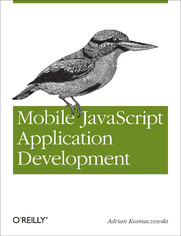Mobile JavaScript Application Development. Bringing Web Programming to Mobile Devices - Helion

ISBN: 978-14-493-2781-1
stron: 168, Format: ebook
Data wydania: 2012-06-18
Ksi─Ögarnia: Helion
Cena ksi─ů┼╝ki: 29,90 z┼é (poprzednio: 78,68 z┼é)
Oszczędzasz: 62% (-48,78 zł)
When developing apps for the latest smartphones, you’re faced with several vexing questions. How many platforms do you need to accommodate? What level of support do mobile browsers provide? To help you address these and many other key issues, this guide provides a hands-on tour of the most powerful JavaScript frameworks available today.
You’ll build sample apps with jQuery Mobile, Sencha Touch, and PhoneGap to learn the unique advantages—and disadvantages—of each framework. From there, you can determine which one is best for your project. This book is ideal for web developers familiar with JavaScript, HTML, and CSS.
- Experience the simplicity of jQuery Mobile for building cross-browser applications
- Learn how Sencha Touch’s architecture, widgets, and blazing-fast rendering engine makes it a good choice for enterprise software
- Use PhoneGap to package your web app into a native iOS, Android, or Windows Phone application
- Discover the impact of various HTML5 features on mobile app development
- Pick up JavaScript productivity tips as you delve into its object orientation, closures, and coding conventions
- Test and debug your app with a collection of tips, tricks, and tools
Osoby które kupowały "Mobile JavaScript Application Development. Bringing Web Programming to Mobile Devices", wybierały także:
- Programming the Mobile Web. Reaching Users on iPhone, Android, BlackBerry, Windows Phone, and more. 2nd Edition 157,37 zł, (29,90 zł -81%)
- Building Android Apps with HTML, CSS, and JavaScript. Making Native Apps with Standards-Based Web Tools. 2nd Edition 135,91 zł, (29,90 zł -78%)
- Android 3. Tworzenie aplikacji 147,78 zł, (39,90 zł -73%)
- Android. Podręcznik hackera 88,93 zł, (24,90 zł -72%)
- Android Studio. Tworzenie aplikacji mobilnych 68,62 zł, (19,90 zł -71%)
Spis tre┼Ťci
Mobile JavaScript Application Development. Bringing Web Programming to Mobile Devices eBook -- spis tre┼Ťci
- Mobile JavaScript Application Development
- SPECIAL OFFER: Upgrade this ebook with OReilly
- A Note Regarding Supplemental Files
- Preface
- Introduction
- Fragmentation
- Growth of the Mobile Web
- New Paradigms
- Who Should Read This Book
- Book Structure
- What You Need
- Code of the Book
- Acknowledgements
- Conventions Used in This Book
- Using Code Examples
- Safari Books Online
- How to Contact Us
- 1. HTML5 for Mobile Applications
- A Bit of History
- Declarations and Meta Tags
- A Minimal HTML5 Document
- Doctype
- Charset
- JavaScript and Stylesheets
- New and Obsolete Elements
- HTML5 Applications
- Add Web Apps to Home Screen in iOS
- Add Web Apps to Home Screen in Android
- Metadata for HTML5 Applications
- HTML5 Application Cache
- Manifest Files in Apache
- Manifest Files with PHP
- Manifest Files in IIS
- Manifest Files in .NET
- Debugging Manifest Files
- Testing for HTML5 Features
- Geolocation
- Device Orientation
- Device Motion
- Network Connectivity
- Canvas
- CSS3 Animations and Transitions
- Transitions
- Animations
- Final Considerations
- Client-Side Storage
- SQL Storage
- Rich Media Tags
- Conclusion
- 2. JavaScript Productivity Tips
- About JavaScript
- Some Coding Tips
- Object Literals
- Single or Double Quotes?
- JavaScript Base Types
- Dynamic Overloading of Base Types
- Functions
- How to Organize Code in namespaces
- Create Objects and Arrays the Easy Way
- Create a Singleton Object
- Scheduling Function Execution
- Concatenating Strings
- Iterating Over Arrays
- Using toString() for Reflection
- Easy Code Injection
- Object-Oriented Programming in JavaScript
- The self Trick
- More Ways to Do the Same Thing
- Another Common Way to Create Custom Types
- Passing Options
- Conclusion
- About JavaScript
- 3. jQuery Mobile
- Supported Platforms
- Compatibility
- Compatibility with Older Mobile Platforms
- Key Features
- At a Glance
- To Do List Application
- The HTML File
- Pages
- Lists
- Buttons
- Customizing the Look and Feel
- Navigation
- Page Lifecycle
- Forms
- Plug-ins
- Storage
- Codiqa
- ThemeRoller
- Conclusion
- Supported Platforms
- 4. Sencha Touch
- Introduction and History
- Characteristics
- Supported Platforms
- Key Features
- GUI Controls
- CSS Transitions and Animations
- Touch Event Management
- Application Data Support
- JavaScript Idioms
- Descriptive Dictionary Pattern
- Object Orientation in Sencha Touch
- Creating a To Do List App
- Create the HTML
- Starting the Application Code
- Transitions
- Creating Instances
- Stores, Proxies, Writers, and Readers
- The Data Model
- Creating the List
- Creating a To Do Item Form
- A Controller to Rule Them All
- Reacting to Events
- Navigation
- Using Sencha Architect 2
- Conclusion
- 5. PhoneGap
- Introduction
- Supported Platforms
- Supported Features
- Basic Usage
- Installing PhoneGap
- Creating an iOS Application
- Creating an Android Application
- With Eclipse
- With IntelliJ IDEA
- Creating a Windows Phone Application
- Accessing Native Functionality
- Plug-ins
- The JavaScript Bridge
- PhoneGap Kitchen Sink
- The deviceready Event
- Multitasking Events
- Network Connectivity Events
- Battery Events
- Accelerometer
- Address Book
- Audio Recording and Playback
- Camera
- Connection Status
- Filesystem
- Location and Compass
- Notifications
- Storage
- Conclusion
- Introduction
- 6. Debugging and Testing
- Your Browser Web Inspector
- Inspect the HTML of your app
- Log Messages in the Console
- Set Breakpoints in Your JavaScript Code
- iWebInspector
- Adobe Shadow
- Testing
- Jasmine
- Siesta
- Conclusion
- Your Browser Web Inspector
- 7. Conclusion
- Bibliography
- Books
- Generic References about Mobile Web Technologies
- Websites about HTML5
- Websites about CSS3
- Websites about JavaScript
- Other Frameworks
- About the Author
- SPECIAL OFFER: Upgrade this ebook with OReilly
- Copyright





